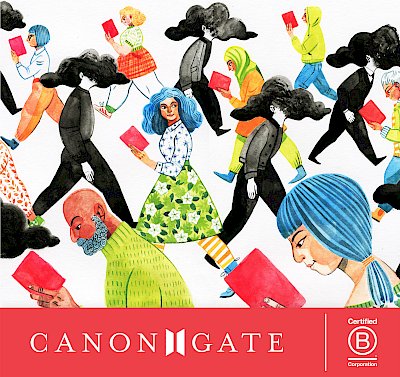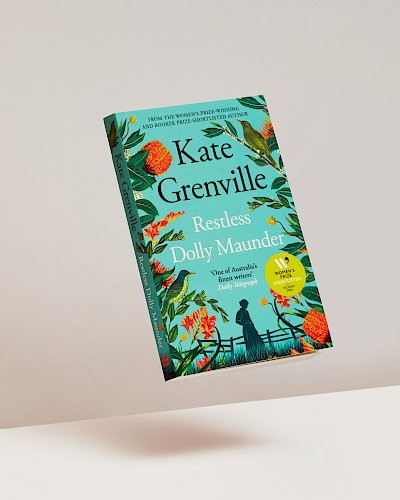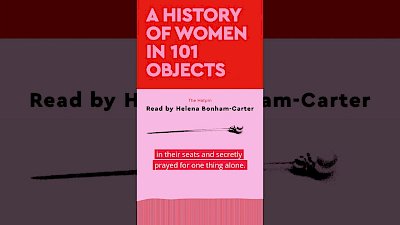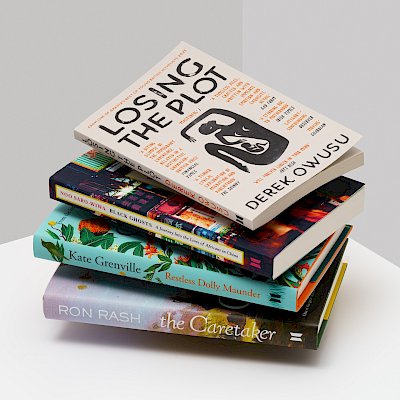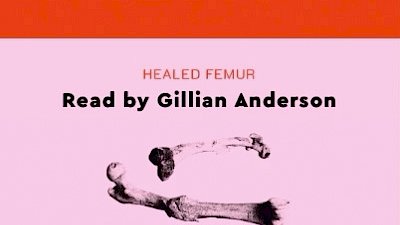“I don’t go to books for comfort; I have a memory foam pillow for that”

With his memoir Homework out now, Geoff Dyer talked to the Guardian about books: from the book he’s reread more than any other, to the book he is currently reading.
Guardian
The trailer for the new film The Roses, starring Benedict Cumberbatch and Olivia Colman, based on The War of the Roses, Warren Adler’s darkly comic cult classic, which we are publishing in the UK for the first time ever this August.
Amy Liptrot has written a piece for the Guardian on the strangness and delight of seeing her memoir The Outrun adapted into the new film starring Saorise Ronan.

“Late at night, in bed with my laptop close to my face, I watch movie star Saoirse Ronan’s face reflected in her onscreen laptop, and I am looking into a weird mirror. The character she’s playing is based on me, and making this film has been like going through the looking glass.
One morning earlier in the year, I clicked a link and watched Saoirse at the farm where I grew up, in a boilersuit, with blue dye in her hair, rolling a cigarette. My toddler son pointed at the screen: ‘Mummy!’ My essence had been recreated authentically enough to fool my child and to confuse and thrill me.”
Amy Liptrot
Guardian

“Learning to care for the leveret was a process of experimentation, painstakingly hand-feeding it with powdered kitten milk, which it consumed in microscopic quantities. Warm and soft and almost weightless, it fitted easily within the curve of my hand. I moved it to a bedroom at the farthest end of the barn, where I thought it would be least disturbed, and with a door opening on to the enclosed inner garden. I cut a hole in the side of its box, so the leveret could come and go as it wished.”
Read an extract from Raising Hare by Chloe Dalton in the Guardian.
Guardian
Kevin Barry adoringly reviewed in the Guardian by Sandra Newman:
“Barry’s books are known for their stylistic brilliance, and The Heart in Winter is no exception. Terse and acrobatic, the novel effortlessly walks the line between goofy and gothic. Almost every sentence is quotable. It’s woven from plain-spoken lyricism (“the last winter days went by like weary brokedown soldiers at the end of a war”) and jokes that are at once subtle and silly (“Tom Rourke salted the eggs unambiguously”)… I doubt that anyone will publish a novel this year that is at once so beautiful, so lovable and so much fun.”
Sandra Newman
Guardian
Listen to an extract from A History of Women in 101 Objects: ‘The Hatpin’, read by Helena Bonham-Carter.

“An incredibly effective portrait of a reeling mind”: the new film version of The Outrun, starring Saoirse Ronan, has premiered at Sundance, and the Guardian calls it “a moving and delicate adaptation”.
Guardian

“If there’s one gift I have as a writer, it’s patience. Sometimes, I think that I just out-patience the idea, and after four or five years, it just comes out with its hands up. ‘You’re still fucking here? I surrender.’”
Mike McCormack interviewed in the Guardian on his writing, including new novel This Plague of Souls.
Guardian
An extract from the first chapter of A History of Women in 101 Objects: ‘Healed femur’, read by Gillian Anderson.
The hardback of the book is available now, the audiobook will be published on 5 March 2024, featuring 101 notable women including Margaret Atwood, Olivia Colman, Elif Shafak and more still to be announced. Canongate will donate a portion of the sales of the audiobook to Refuge, supporting women and their children experiencing domestic abuse.
Listen, by turns discursive, celebratory and reflective, is a beautifully written and endlessly readable paean to music, examining both the role that it plays in our lives and what it has meant to Faber himself.
Observer







